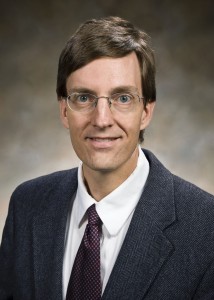R. William Ayres, associate dean of Wright State University’s Graduate School, has been inducted into the Council of Graduate Schools’ Government Relations Advisory Committee.
Ayres was inducted for a two-year term during the council’s annual meeting in Seattle in December.
Robert Fyffe, vice president for research and dean of the Graduate School, said Ayres’ appointment elevates the visibility of Wright State and will give the university a better understanding of, and voice in, state and federal policy changes affecting graduate education.
“It’s an added opportunity to go and get the Wright State name in front of people at the federal level,” Ayres said.
Headquartered in Washington, D.C., the Council of Graduate Schools consists of U.S. universities that account for more than 90 percent of the nation’s graduate degrees. Its mission is to advance graduate education and promote U.S. competitiveness in the global economy. It provides resources for its members, including hosting conferences and conducting studies.
The council’s Government Relations Advisory Committee advocates for graduate education with state and national policymakers.
Ayres joins committee members from the University of Iowa, University of Washington, Florida State University, University of Houston, Rutgers University, University of California-San Francisco, South Dakota State University and the University of Tennessee Chattanooga.
In addition to four annual teleconferences to discuss issues, the committee members will gather in Washington, D.C., in April to meet with lawmakers on Capitol Hill to discuss graduate education.
“I’m really looking forward to learning more about the interface with governments at the federal level as well as the state level,” said Ayres. “We spend a lot of time advocating for what we do, explaining what graduate education does. Why wouldn’t we want to communicate that to people who control resources that we might be able to get some of?”
Ayres said matters up for discussion include funding issues, including the recent lack of growth in the budgets of the National Science Foundation and National Institutes of Health.
“A lot of it goes to support graduate education,” he said. “And the need continues to grow.”
Other issues include federal policies on the salaries of postdoctoral students, taxes on the subsidizing of health insurance for graduate students and questions about whether visas for international students in STEM fields will remain extended, making U.S. graduate programs more attractive to the students.
Ayres has long been a champion of graduate education.
“People go to college to get a bachelor’s degree. You become educated broadly and become competent in a field,” he said. “You go to graduate school to become an expert. This is where expertise comes from. This is where it resides.”


 Wright State gold team captures 2024 Horizon League team title, Flynn individual champion
Wright State gold team captures 2024 Horizon League team title, Flynn individual champion  118 medical students to graduate from Wright State’s Boonshoft School of Medicine April 28
118 medical students to graduate from Wright State’s Boonshoft School of Medicine April 28  Wright State University continues to demonstrate its financial strength with another credit rating upgrade from Moody’s
Wright State University continues to demonstrate its financial strength with another credit rating upgrade from Moody’s  Thousands celebrate the end of Spring Semester with food, fun and friendship
Thousands celebrate the end of Spring Semester with food, fun and friendship  Nearly 1,500 students to graduate at Wright State’s spring commencement ceremonies
Nearly 1,500 students to graduate at Wright State’s spring commencement ceremonies 